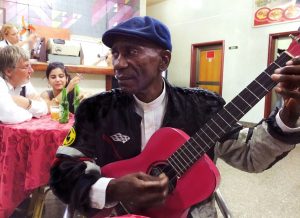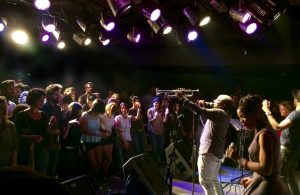Article, photos and video by Mark Garzon and Nicholas Leung
HAVANA – On a busy Sunday night at Café Madrigal, on the second floor of a crumbling mansion in the Vedado neighborhood of Havana, patrons lined the small bar and crowded the tables in the dim light. The space, encased in cracked brick walls covered with posters of Marilyn Monroe and classic noir films, was filled with music from Pachamama, a three-man band.
The music from the pianist, bassist and drummer, was eclectic. Some songs were Cuban, but at one point Pachamama put a fresh spin on “New York, New York,” performing the song with a honky-tonk beat.

“Jazz and rock and roll are my favorite genres to play,” said Pachamama’s drummer, Rodobaldo, who asked to be identified only by his first name. Rodobaldo, like many Cuban musicians, has grown up influenced by American music, mixing it with their own Cuban sound.
While diplomatic relationships between the United States and Cuba only recently began to warm, music has been bridging the gap between the countries for decades, even after the U.S. trade embargo was put in place 55 years ago.
American music found its way to Cuban ears through radio broadcasts from south Florida, bootleg copies of television shows such as Soul Train and black-market flash drives called paquetes semanales, sent from the U.S. weekly containing music, movies and other forms of popular culture and shared among Cubans.
Several musicians said they were inspired by American artists including Alicia Keys, Stevie Wonder and Marvin Gaye.
“My family sends me music from New York City,” said Rodobaldo, as he scrolled through his phone’s extensive music library.
“Do you know them?” he asked as he pointed at songs by The Dave Matthews Band and jazz great Wynton Marsalis. “Jazz is more universal than salsa. It’s the flagship genre that’s easier to learn.”
Cuban music has always been influenced by other cultures, according to Alberto Faya, a musicologist with Casa de las Américas, a Cuban organization that promotes cultural exchanges with Caribbean and Latin American countries.
He said dance and music in Cuba evolved through a “process of synthesis.” As early as the 17th century, he said, slaves from Africa brought their dance, choreography and songs to the island and began mixing their traditions with European influences. As time went on, American genres such as jazz began to influence the island as well, Faya said.

It’s not just a one-way street. Cuban music has been played in the United States for decades, with big bands like the one led by Xavier Cugat touring the U.S. and appearing on television before the Cuban revolution. In the 1990s, through the interest of the blues guitarist Ry Cooder, the Buena Vista Social Club, a Havana-based jazz band, began touring widely, playing at Carnegie Hall, Lincoln Center and the White House (the band was the subject of a documentary film by Wim Wenders).
Luis A. Perez, a guitarist with the band Voces Cuba, observed, “Before, American bands would come and play in Cuba. However, there was a time when they stopped but now things may change.”
Perez has been playing for 18 years. On a recent Monday evening, he and his fellow band members – two singers, a bassist and a drummer – performed at Sofia, a Havana restaurant.
“I used to play the saxophone, but I got sick so I stopped,” he said. Then he heard Stevie Wonder’s “Sir Duke” for the first time on the radio and he learned to play the song on his neon-pink Cuban tres, a type of guitar with three strings. Since then, he has been influenced by guitarists such as B.B. King and various players from Haiti and the Caribbean.
“My musical influences contaminate one another,” said Perez.
VIDEO: SCENES FROM HAVANA’S MUSIC CLUBS
Casual music listeners also embrace American popular music that is heard in Cuba. Orlando Ochoa Méndez, a Cuban guide for a U.S. company that organizes tours for Americans in Cuba, first experienced American music when his friend brought him a cassette tape of an Eminem concert.
“I love that guy!” he said. “Those guys are so weird, but they’re such great performers.”
Hip-hop, a genre that springs from African-American culture, has also been influenced by the blending of Cuban and American music. Obsesión, a male-female duo from Havana, has been leading the Cuban hip-hop revolution since 1996.
“When writing a song and making a record, hip-hop is not always the music that inspires that,” said Alexey Rodriguez, the male half of the band. In fact, when he and Magia Lopez write music together, they often look to Motown and soul artists such as Marvin Gaye and The Temptations.
Yet Faya, the musicologist, said current Cuban music has a difficult time spreading to the United States. “This is a problem of economics,” said Faya. “Resources play a major role because if there are not enough of them then Cuban music cannot spread.”
